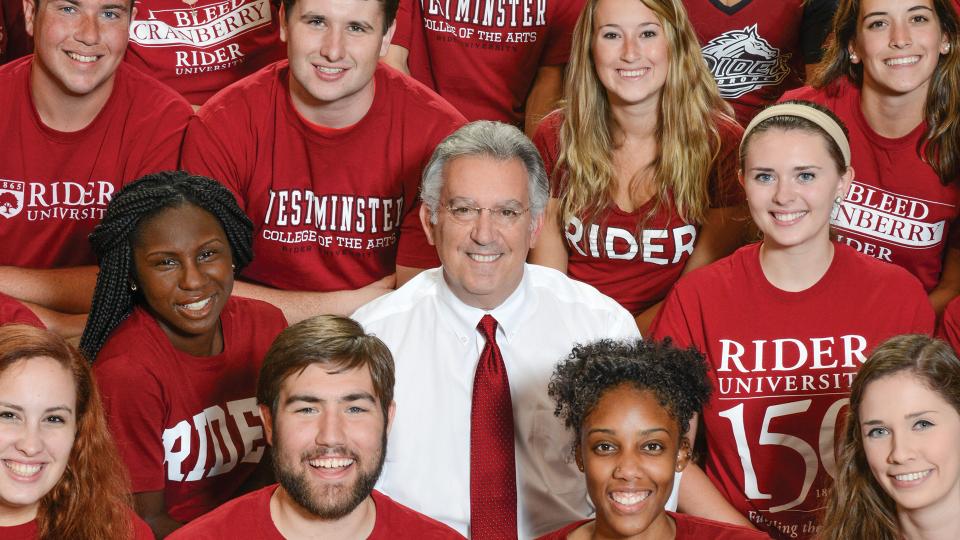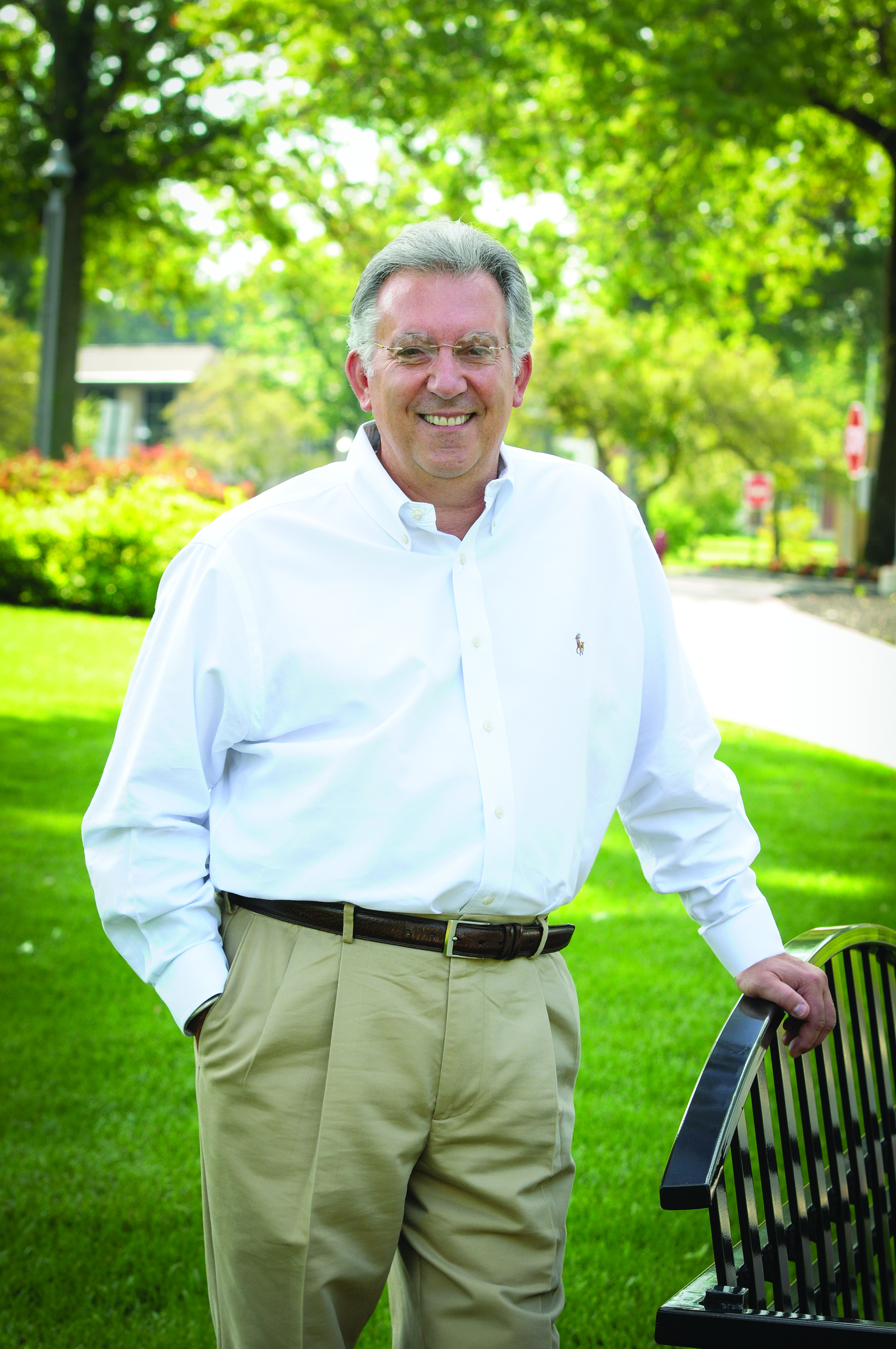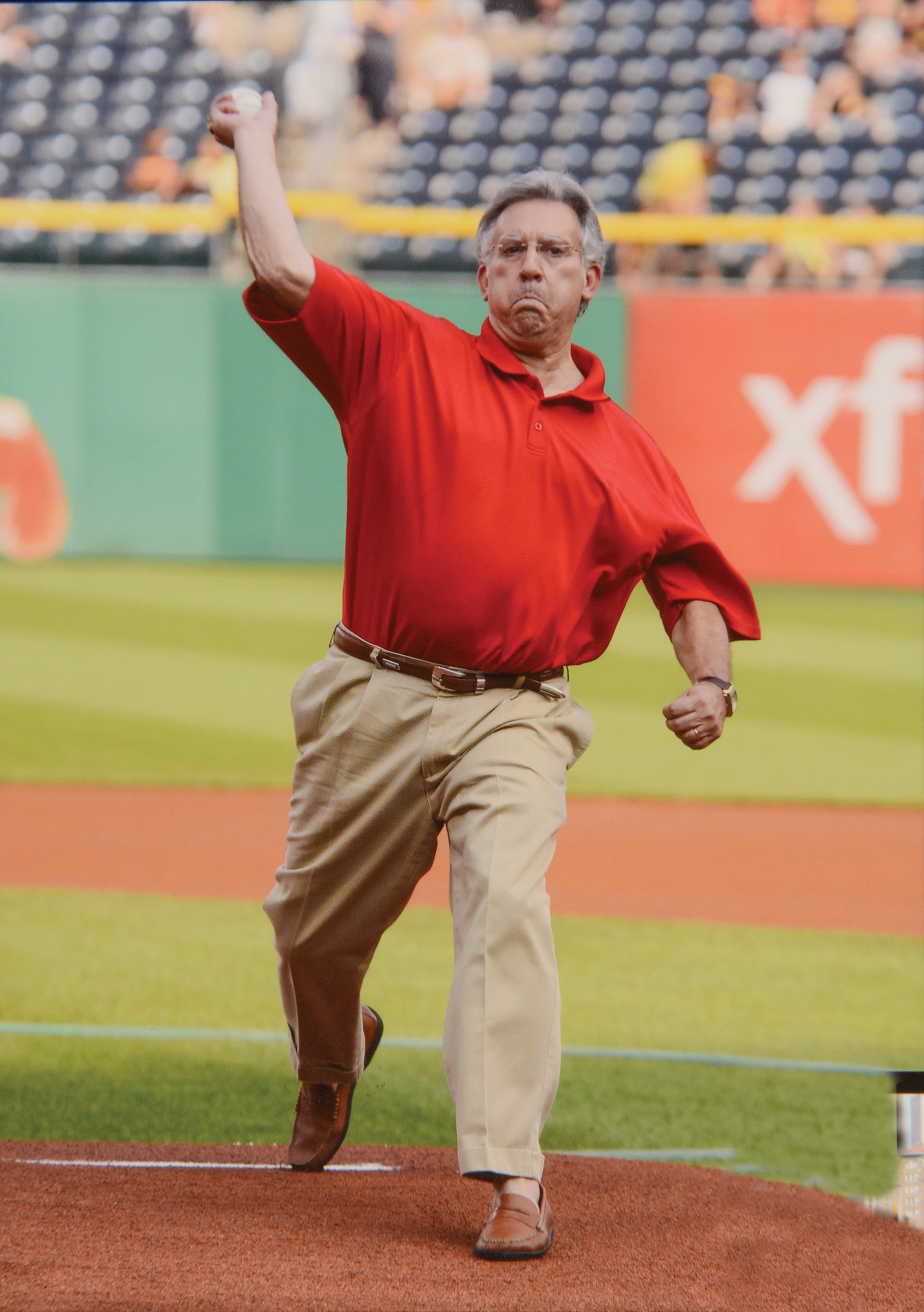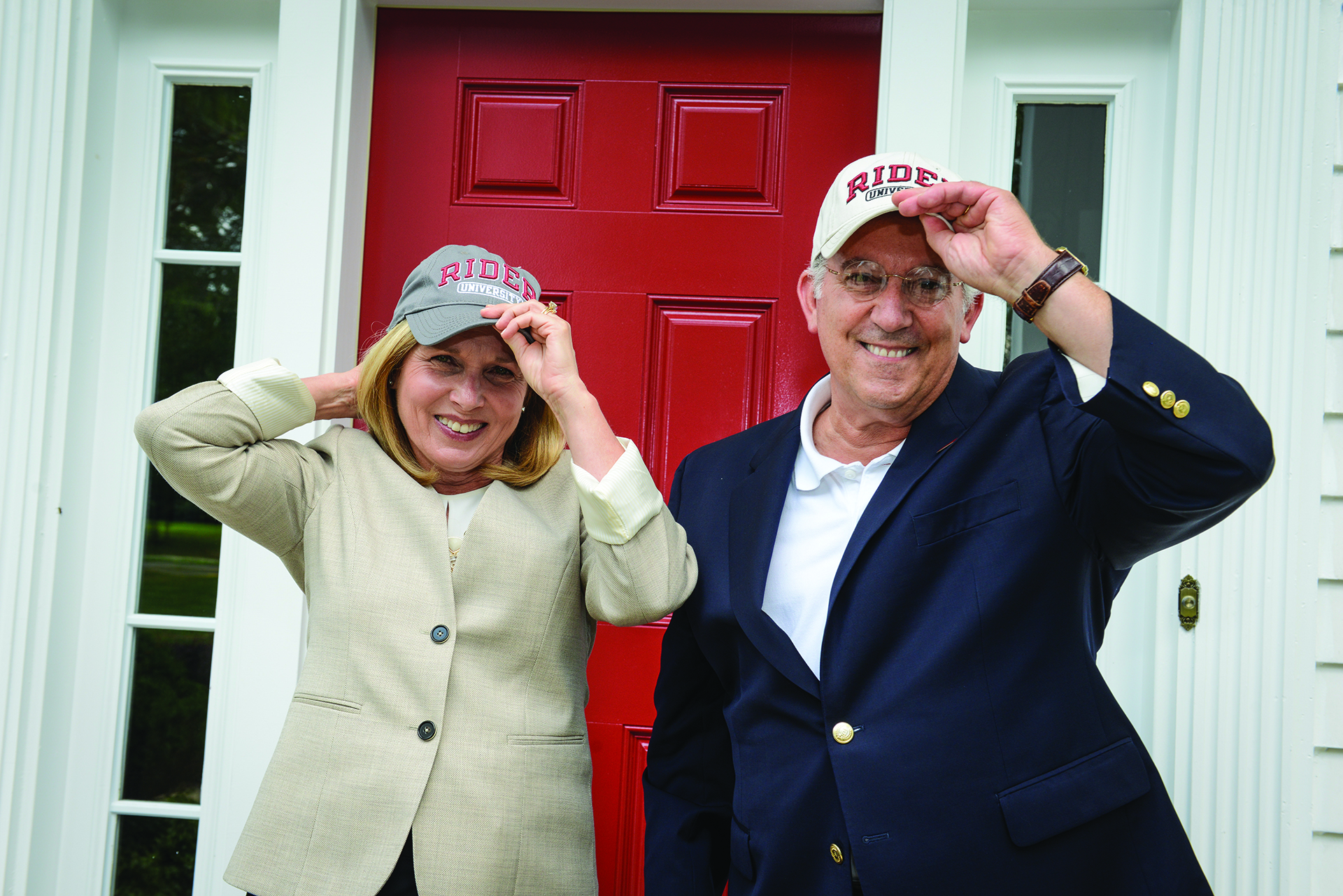by Adam Grybowski
One day in the fall of 2014, the chairman of Rider University’s Board of Trustees persuaded the president of Robert Morris University to join him for a private meeting over lunch. Chairman Michael B. Kennedy ’72, ’75 was leading an extensive national search to find a successor to then President Mordechai Rozanski, who was preparing to retire as the sixth president in Rider’s 150-year history. Gregory G. Dell’Omo, Ph.D., was a top candidate to become president number seven.
Kennedy and Dell’Omo met at a restaurant near the Delaware River, where the colorful oak trees on the river’s edge reflected the change of season. Kennedy had scrutinized Dell’Omo’s credentials and, in collaboration with the search committee, determined his experience was an outstanding match for the University.
Dell’Omo was riding a wave of phenomenal success that saw RMU’s enrollment skyrocket, its endowment swell and its reputation surge. He had helped transform the university’s identity from a commuter school in Pittsburgh, Pa., to a residential campus where students wanted to live and learn. Coffers from a recent capital campaign were flush, and new academic buildings and residence halls were rising on campus as if it were a new city. In the spring, the men’s basketball team would enter the NCAA tournament for the second time in five years. Athletics, like much everything else under Dell’Omo’s watch, were thriving. Why would he want to leave?
“I could have stayed at RMU and been perfectly happy,” he says, “but I was starting to get restless. I felt like I had one more presidency in me, and it seemed like the right time to help Rider achieve even more success than it has had in the past. I like the idea of trying to take a given institution and bring it to an even higher level of excellence. I love the challenge and the opportunity.”
After meeting him in person, Kennedy was encouraged that Dell’Omo’s personality was as impressive as his professional credentials and that both fit the vision of Rider’s future. Dell’Omo was similarly swayed. He walked away from the meeting convinced he would become a Bronc.
A vibrant living and learning community
Dell’Omo officially became Rider’s seventh president on Aug. 1, 2015. He is presently in the process of familiarizing himself with the Rider community on both campuses by meeting with as many people as he can as part of what he calls his “listening tour.”
As Dell’Omo begins the work of developing a new strategic plan for the University, he already has ideas for a broad vision for Rider. “I want to focus on the idea of enhancing the sense of community at the University,” he says. “My goal is to build on our strengths to offer a Rider experience that better integrates academics, student and residential life and athletics to become a known entity in which alumni and other friends of Rider will want to invest.”
Dell’Omo (pronounced “DELL AH-mo”), who lists coffee as his sole vice, brings considerable energy to the job. His days begin early — 6 a.m. at his kitchen table, where, in between the steady arrival of new email, he digs into three print newspapers to stay current on the local, national and global issues of the day. Along with that energy comes a willingness to experiment. “Let’s not be afraid to try new things, especially in our university setting,” he says. “I’d rather attempt 10 really ambitious initiatives and have four succeed than try three very safe things.”
Generating passion for the institution is one of Dell’Omo’s primary goals. Aside from creating a nurturing and fulfilling environment, he also believes that a feeling of excitement on campus strengthens the University overall. “My goal is to make sure that, from me on down, there’s a love of being here; that we’re allowing people to see that Rider is a place where special things happen,” he says. “I want everyone in the University to believe they own this institution. I want them to treat it like it belongs to them, so they will be inspired to make it an even better place to learn and work.”
Dell’Omo has often said he views athletics as the front door to invite the wider world into university life. A die-hard sports fan whose allegiance in the world of professional sports tilts toward the Yankees, Giants, Knicks and Rangers, he has seen the benefits of athletic success first hand. He was the vice president for external affairs at Saint Joseph’s University when the men’s basketball team completed a perfect 2003-04 regular season, earned a No. 1 national ranking and made it to the Elite Eight of the NCAA Tournament. The season had such a profound impact on the awareness of the school that a man once interrupted Dell’Omo during a presentation in Hong Kong because he wanted to question Dell’Omo about St. Joseph’s star point guard.
“I saw what athletics could do for name recognition, which is tough because there’s so much noise and competition out there,” says Dell’Omo. “In my opinion, nothing has the same immediate and positive impact on a university’s reputation as athletic success.”
Dell’Omo holds an ardent belief that active participation in college sets the stage for a successful career and a fulfilling life, and he is keen to share that message with students. He and his wife, Polly, often host students in their home, and he is well-known for being an engaged presence on campus, whether sitting in the stands for athletic events (and even practices), attending student theater performances or chatting with members of the campus community over lunch in the dining hall. “The undergraduate years are such a unique time in an individual’s life, and not just for what a person gains in the classroom,” he says. “The personal growth students experience is critically important to their development, and becoming involved in the community is what facilitates that experience.”
New Jersey roots
Dell’Omo’s faith in the positive benefits of an active college career began, for him, as an undergraduate at Montclair State University. A native of Rumson, N.J., where he played baseball and football in high school, he considered playing baseball as a Bronc in the 1970s before enrolling at Montclair, which is about 90 minutes north of Rider in Clifton, N.J.
As an undergraduate, he immersed himself in campus life, joining clubs and organizations. He worked as a resident advisor, became president of the economics club and attended numerous and varied events, including an early performance by a Jersey Shore rock ’n’ roller named Bruce Springsteen. (“The Boss” remains Dell’Omo’s favorite musician to this day.) Those co-curricular and personal experiences continue to reverberate in his life. “I fell in love with the intellectual side of college,” Dell’Omo says, “but I also liked the sense of community and the constant interaction with faculty, staff and other students.” At Montclair, two of Dell’Omo’s early ambitions were thwarted. First, he realized he would never play shortstop for the Yankees. Second, after he decided he would be happy teaching math and coaching baseball at the high school level, a required and uninspiring calculus class turned his attention away from mathematics altogether. He switched his major to economics and, with advice from his father, set his new long-term sights on law school.
Meanwhile, he married his high school sweetheart, Polly Evans, whom he had known since sophomore year at Rumson-Fair Haven Regional High School, where they crossed paths in homeroom and on visits to their nearby lockers. The couple now has three grown children and two grandchildren. Polly, who has a bachelor’s in mathematics from Montclair and a master’s in instructional leadership from Robert Morris University, has developed an academic identity of her own as a professor and tutor.
As a newlywed and young father, Dell’Omo enrolled at Syracuse Law School after earning his bachelor’s degree. “Money was tight,” he recalls. “I took a leave of absence and began a six-month junior executive training position at a department store called Dey Brothers. Before I knew it, I was doing well at the job and extended my leave of absence from law school.”
Dell’Omo was transferred from Dey Brothers to Stern Brothers in New Jersey and eventually worked for Saks Fifth Avenue and then Macy’s in New York City. Living in the Garden State, he settled into a comfortable suburban existence: a daily commute into the city, a house and a growing family. He also began working on a master’s degree at Rutgers University in industrial relations. One night, after he and Polly put their daughter to bed, the couple took stock of their lives. In many ways, things were great, but was it what they really wanted? Listening to her husband talk about his wish to earn a doctorate and become a college professor, Polly encouraged him to pursue his dreams.
The couple sold their house and moved to Wisconsin, where Dell’Omo earned a doctorate in industrial relations/human resource management in 1987 from the University of Wisconsin-Madison. “The reason I am here today is because of my wife,” he says. “That decision that Polly essentially drove changed our lives.”
Four years later, they returned to the East Coast, where Dell’Omo began working as an assistant professor of management at Canisius College in Buffalo, N.Y. He then spent 14 years at Saint Joseph’s University in Philadelphia, Pa., as professor of management, dean of the business school and then ultimately vice president for external affairs before being named president of Robert Morris University in Pittsburgh in 2005.
Coming full circle a decade later, Dell’Omo’s return to his native state and to the presidency of Rider is the fulfillment of a life-long ambition. “I’ve lived in Wisconsin, Buffalo, Syracuse and Pittsburgh, but there’s something about New Jersey that’s unique,” he says. “I love the candor and the honesty, the diversity and the energy level.”
‘The new normal’ in higher education
Dell’Omo believes that running a university is more challenging today than in 2005, when he first became a university president. “2008 changed everything,” he says, referring to the U.S. financial crisis that rocked the nation’s housing market and erased the opportunity for many to draw on home equity loans, which had become a convenient way to pay for education. “The result is that although net tuition on the national level hasn’t increased substantially, students have to pay more because the ability to borrow has been constrained,” Dell’Omo says. He counts the financial challenges of today’s students as part of “the new normal” in higher education.
That shift altered the relationship between universities and their students. For a long time, colleges and universities existed primarily to provide knowledge to students. While that remains the foundation of the scholar/university connection, prospective students increasingly demand to learn how that knowledge will lead to a practical outcome, like a job in one’s major or admittance to a graduate program. More than ever, prospective students seek value from their educational investments in much the same way that educated consumers seek value from purchased goods and services.
“It’s no longer sufficient to merely provide content and knowledge to students — that’s certainly the minimum expectation, and the better you do that, the better your reputation,” Dell’Omo says. “However, parents and students in 2015 are looking for a return on their educational investments, and we have to demonstrate that return better than our public and private competitors.”
What students expect from their university experiences has changed alongside what businesses expect from new hires. Gone, for the most part, are companies that invest years to train bright young graduates, helping them realize their professional potential. “Today, when students graduate and are hired by a company or a nonprofit, that organization expects them to add value from day one,” Dell’Omo says. “It’s a heavy burden on students and the University, but I believe it’s our responsibility to create an engaged learning environment that helps students have the kinds of experiences they need so they can graduate and be ready to make immediate contributions.”
Dell’Omo hopes to formalize a student engagement program at Rider, similar to the one he instituted at RMU. He made true student engagement a graduation requirement, codifying and validating the internships, study abroad opportunities and other co-curricular activities many students were already participating in. RMU graduates receive two transcripts, one that summarizes their academic credentials and another that conveys their engaged learning experiences and extracurricular activities.
At Rider, the kind of experiential learning on which Dell’Omo places such a high value dovetails naturally with several existing academic programs, such as student teaching in the School of Education and performances in the Westminster College of the Arts. “The arts are the ultimate experiential learning experience,” Dell’Omo says. While admittedly lacking in musical talent himself, he appreciates the value of the arts, particularly music. He views Westminster Choir College as a “jewel” among Rider’s portfolio of offerings. “To have it as part of the Rider family adds to the diversity of the institution and elevates us as a whole,” he says.
A former member of the Pittsburgh Symphony and Pittsburgh Civic Light Orchestra Boards of Directors, Dell’Omo and Provost and Vice President for Academic Affairs DonnaJean Fredeen will spend ample time on the Westminster campus in Princeton. “The office space goes beyond symbolism,” he says. “The Princeton campus happens to be seven miles away, but it’s still our campus. Rider’s president should not be perceived as a visitor, but as a fully committed member of the Westminster community.”
That sense of community is at the heart of the environment Dell’Omo has set his sights on creating at Rider. “I want it to become known regionally and nationally,” he says, “that students will have an experience at Rider University that they would not receive anywhere else.”




